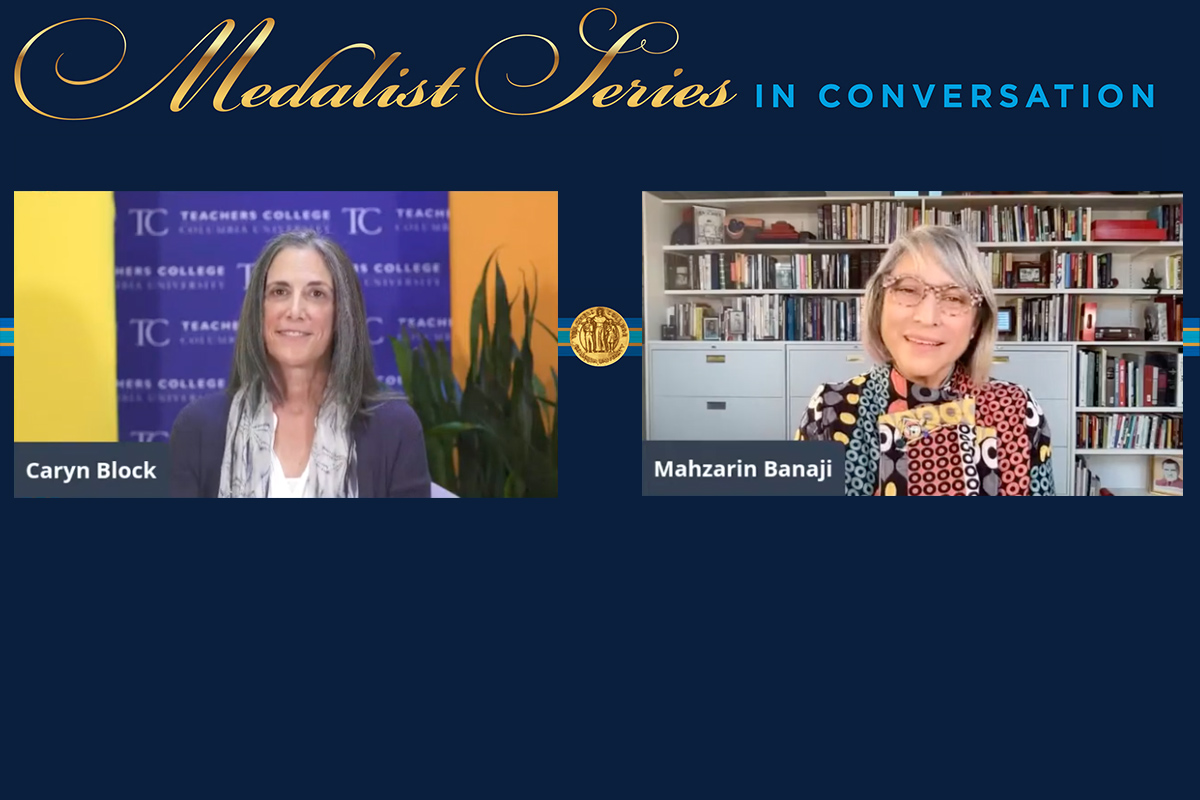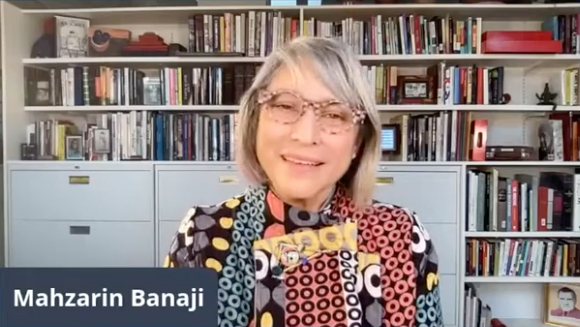The Harvard professor credited with introducing theories of “implicit bias” into the national conversation on race, gender, sexual identity and body weight wants Teachers College’s 2021 graduates to take the long view of themselves and those around them.
“It’s hard to give up your own sense of what reality is,” TC Distinguished Service Medal recipient Mahzarin Banaji said, addressing herself to the Class of ’21 during a wide-ranging discussion of her life and work with Caryn Block, Professor of Psychology & Education. “So, use the eyes of the other to see the world. And shape the views of the other to see the world from your unique perspective. What Teachers College has given you is an ability to be able to say perplexing things to people that will open up a world they haven’t been able to see.”
Banaji, Harvard’s Richard Clarke Cabot Professor of Social Ethics and co-author of Blindspot: Hidden Biases of Good People, made her remarks last night during the second of three Medalist Series Conversations that are part of Convocation week at TC. Banaji, Shannon Watts (founder of Moms Demand Action for Gun Sense, who spoke on Monday evening with faculty member Sonali Rajan) and Carol Dweck (the Stanford University psychologist and originator of the “growth mindset” concept, who will speak tonight at 7 p.m. with faculty member Nathan Holbert) reeived TC’s Distinguished Service Medal in 2020 but did not speak then because of the pandemic. [Read about — and watch a video of — last night’s conversation between Watts and Rajan.]
It’s hard to give up your own sense of what reality is. So, use the eyes of the other to see the world.
—Mahazarin Banaji, Richard Clarke Cabot Professor of Social Ethics and co-author of Blindspot: Hidden Biases of Good People
Banaji noted that TC’s 2021 graduates are forging their careers at a time when the nation is grappling with precisely the kind of systemic, institutional biases that are the focus of her research. A recent analysis of the Harvard Implicit Association Test (IAT), a measurement tool she co-developed that exposes the stereotyping that all humans (herself included) engage in “shows us our bias but it also shows us that we are capable of change,” Banaji said. Specifically, there has been a precipitous decline in the number of Americans holding negative views of same-sex relationships, Banaji said, but IAT data also shows that negative stereotypes attached to race and skin color are decreasing at a slower rate.
Another positive development, suggested Block, a Social-Organizational Psychology program faculty member whose research focuses on diversity issues in workplaces and communities, is that “systemic racism has played out on camera and we can no longer deny where we are in this country.”
Bias education is a powerful response to what the camera is showing us, Banaji said – but, she cautioned, it cannot be employed as a quick fix.
“I’m very critical of people who use implicit bias training as a band-aid,” she said. “But I’m also critical of people who say it is not worthwhile. Think about the problem of climate change. Would anyone ever say they recycled for two days in 1990 and the climate didn’t change at all? Why should a little drop in the bucket of implicit bias training for two hours change something I believe is on the scale of climate change? It’s climate inside our head as opposed to the climate outside our head.”
We are in a very exciting moment where, for the first time, the mind sciences are in a position to be able to show us things about ourselves. We have the capacity to tell the difference between the fact we are unfinished, and what awaits us as we evolve further and furthest.
—Mahazarin Banaji, Richard Clarke Cabot Professor of Social Ethics and co-author of Blindspot: Hidden Biases of Good People
Stereotyping and bias will never wholly cease, but Banaji looks at the data as reason to put faith in the human spirit.
“We are in a very exciting moment where, for the first time, the mind sciences are in a position to be able to show us things about ourselves. We have the capacity to tell the difference between the fact we are unfinished, and what awaits us as we evolve further and furthest.
And if we are the good people that I think we are, then we will pay attention.”

